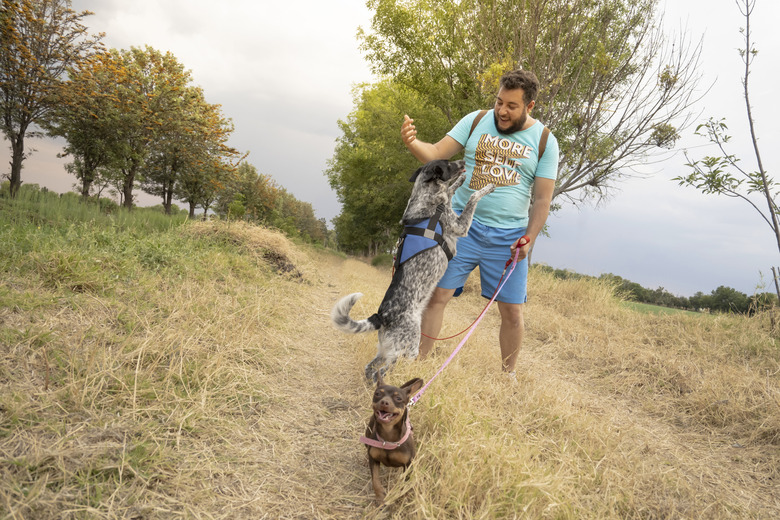Stress & Diarrhea In Dogs
If you've ever been under extreme stress from work, finances, family issues, or any other circumstance, you probably noticed the effects it had on your body. Maybe you experienced an upset stomach, had trouble sleeping, or experienced a frequently elevated heartbeat. Stress doesn't just have a negative impact on humans, though. It can affect your dog in similar ways, leading to digestive issues and behavioral changes.
Can stress cause diarrhea in dogs? Yes, your dog can experience diarrhea from stress, and it's important to take action to help them get relief when it occurs.
Stress colitis in dogs
Stress colitis in dogs
Stress can cause colitis in dogs. Colitis is an inflammation of the large intestine or colon. It can cause diarrhea, as well as other symptoms.
When your dog has colitis, they may experience symptoms that include:
- Frequent defecation
- Fresh (red) blood in stool
- Mucus in stool
- Straining to defecate
- Flatulence
- Decreased appetite
- Producing smaller amounts of stool more often
- Semi-formed or liquid feces
If your dog has diarrhea, it's important to consult your veterinarian to determine the cause and provide your pet with the right treatment. Diarrhea might be a symptom of a more serious problem, and it should be addressed immediately if your dog is experiencing other symptoms, such as loss of appetite, fever, dehydration, vomiting, or weakness.
Diagnosing stress diarrhea in dogs
Diagnosing stress diarrhea in dogs
To diagnose your dog's issue, your veterinarian will likely ask you about recent changes in your pet's life, including food changes, major life events, and recent illnesses. Then, your veterinarian will collect a stool sample to test for intestinal parasites and infection.
Depending on the physical exam and the history of your pet's symptoms and diarrhea, your veterinarian may also want to run other tests, such as bloodwork, X-rays, and an ultrasound.
Because stress and diarrhea can go hand-in-hand, your veterinarian will talk to you about the inciting stressors that may have led to the diarrhea, and how those can be minimized in the future.
Treating stress colitis in dogs
Treating stress colitis in dogs
If your veterinarian determines that your dog does not have an infection, underlying illness, or other condition that's causing diarrhea, and believes the symptoms may be due to stress colitis, the goal will be to resolve the diarrhea as quickly as possible.
Your veterinarian will discuss a treatment plan that may include a special diet to calm the inflammation and medications to treat the diarrhea.
Your dog's treatment will depend, in part, on his condition. Diarrhea can quickly dehydrate dogs, so your veterinarian may administer IV fluids to hydrate your dog. Your veterinarian may also recommend that you feed your dog a bland diet.
Fasting your dog for 12 to 24 hours, and then starting them on a diet of boiled rice and boiled lean chicken breast might be recommended. Feed your dog about a quarter of the amount of food they would regularly eat, and offer these feedings every four hours. Feed the bland diet for four to five days until your dog's stool has returned to normal, then gradually introduce small amounts of their regular food as you reduce the bland diet.
It's important to monitor your dog during treatment carefully. If the problem worsens or doesn't improve after a few days, you will need to return to the veterinarian for assessment and treatment.
Stress, anxiety, and diarrhea – find the source
Stress, anxiety, and diarrhea – find the source
If your dog is experiencing diarrhea because of stress, it's important to not just treat the medical condition, but to also address what is stressing them. Dogs can be stressed by a variety of things, including:
- A move
- A family member who has moved away
- The introduction of a new pet
- Grief for a family member or another pet
- Trips or vacations
- Time spent in a boarding facility
Consider making a list of recent changes to see if you can identify what may be stressing your dog. If possible, try to remove that source of stress, or work with a veterinary animal behaviorist to help your dog cope with the change.
Signs of stress in dogs
Signs of stress in dogs
Your dog may demonstrate their uneasiness in other ways, too, so be sure to watch for additional signs that your pet is feeling stressed. You may notice a decrease in your dog's appetite, and your dog may isolate themselves from people or other pets when they're feeling anxious. A stressed dog may start to sleep more than usual and appear lethargic. You may also notice your dog being unusually aggressive toward other pets or people.
All of the above signs, such as the decrease in appetite and lethargy, can indicate other physical issues and illnesses. Be sure to work closely with your veterinarian to stay on top of your dog's health. Remember that diarrhea can quickly dehydrate your pet, so call your veterinarian if your dog's issues don't resolve soon.


